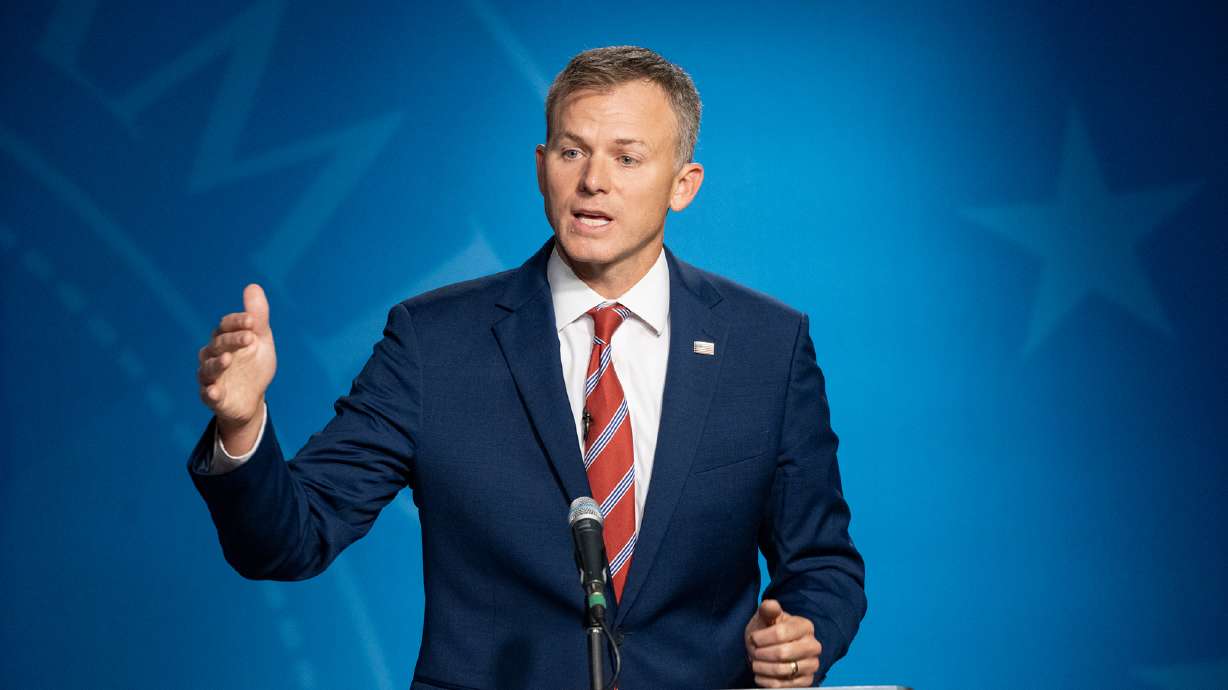Estimated read time: 5-6 minutes
This archived news story is available only for your personal, non-commercial use. Information in the story may be outdated or superseded by additional information. Reading or replaying the story in its archived form does not constitute a republication of the story.
SALT LAKE CITY — Things occasionally got chippy during the 1st Congressional District Republican debate between Rep. Blake Moore and challenger Paul Miller Monday, as the candidates distinguished themselves on their approach to federal spending and foreign aid to Ukraine.
As the incumbent and a member of House GOP leadership, Moore's record was a frequent target of attack from Miller, and the congressman cut in several times to dispute claims made by Miller. Miller told reporters after the debate he "referenced the wrong bill" and accepted Moore's correction, but said he was still pleased with his performance in getting Moore to defend his record on spending bills.
Miller repeatedly attempted to goad Moore into responding directly to questions from him, but Moore deferred to moderator Julie Rose, the host of BYU Radio's "Top of Mind" podcast.
When Miller asked Moore to name the "most negative thing" included in a recent omnibus spending bill, Moore said: "I'll take the questions from you, Ms. Rose."
Despite the handful of tense moments, Moore praised the debate as "respectful" and substantive.
Spending disagreements
As Republicans, both candidates often spoke of the need for reduced spending and border security, though they differed in approach. Miller, an electrical foreman, leaned into his "middle class" background and repeatedly accused Moore of voting to fund President Joe Biden's "agenda."
"I'm not running to compromise; I think the Republican Party has compromised their principles too much," said Miller, who added that compromise only helps Democrats.

But Moore said things in Washington aren't so simple, and he said House Republicans have done what they can with the slimmest of majorities.
"We did what we haven't been able to do since 2013 — Republicans were able to support defense and lower nondefense discretionary spending," he said.
Both candidates went back and forth with each other when asked about voting for bills with provisions they don't fully support. Moore said he believes most previous government shutdowns have not helped the party achieve its goals and have hurt their bargaining power, while Miller was more willing to support a shutdown over passing a budget he didn't like.
He accused Moore of supporting a 2023 spending bill that would have "entered women into the (military) draft." Moore quickly pushed back and explained that the provision was in an earlier version of the bill but was taken out before final passage.
"I voted against the women in the draft clause, we had it removed during the conferencing process," Moore said. "I'm not going to stop our support for our military because of one provision that we know is going to be removed."
Miller later said he is "not here to further Biden's agenda."
"Neither am I," Moore responded. "We agree on that."
Ukraine funding
Both candidates said they believe Russian aggression is a threat, but Miller was less enthusiastic about foreign aid to help Ukraine defend itself.
"I would love to see Putin defeated," he told reporters. "And is it in America's best interest? Yeah, it probably is. But should we be funding the war for it? No. ... We have our own problems here at home. ... We don't have time to keep throwing out money and trying to solve the world's problems by throwing money at it."
"You can't deter Russia without keeping them from invading and taking full control of Ukraine," Moore said. "They are fighting for their own democracy and we have supported them with less than 0.2% of our own GDP."
But Moore said he doesn't want to see an "endless war" in Ukraine and believes former President Donald Trump would be able to bring the conflict to a close should he be elected in 2024.
When asked how Trump would end the war, Moore told reporters Biden should have "done more early on" when it comes to sanctions and other action against Russia, and said the current administration "continues to do just completely nonsensical things" such as temporarily pausing liquified natural gas exports from the U.S. The congressman said such actions blunt the effectiveness of sanctions against Russia.
Though he didn't specifically say what Trump could do to end the war, he said his belief is based on "historical understanding," noting that Russian President Vladimir Putin annexed the Crimean Peninsula during President Barack Obama's tenure and invaded Ukraine during Biden's.
"It did not happen during Trump," he said. "There was advancement almost immediately during Biden. What's the magic sauce here? What can we do to create an end to this conflict? I don't know what those negotiations are, it's not my place to say."
The debate was the second of three debates Monday ahead of the June 25 primary elections.
Candidates for the 2nd District seat Rep. Celeste Maloy and Colby Jenkins clashed over federal spending and immigration in a debate earlier Monday, and the four Republicans vying for Utah's U.S. Senate seat debated Monday evening.
Statewide candidates for attorney general and governor will take the stage Tuesday afternoon and evening, and the five candidates running for the open seat in Utah's 3rd Congressional District will square off Wednesday night.
All contests are held at the PBS Utah studio in the Eccles Broadcast Center on the campus of the University of Utah.
Moore is seeking a third term in office after being elected to the House Republican caucus leadership last fall. He is challenged by Miller, an electrical foreman who advanced to the primary election after winning nearly 55% of the delegate vote during the party's nominating convention in April.









